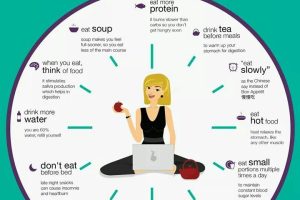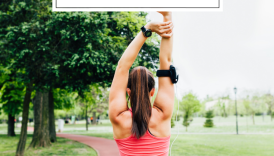Stay Fit Around the Clock: Tips for a Healthy Lifestyle

Importance of Maintaining a Healthy Lifestyle
In today’s fast-paced world, the importance of maintaining a healthy lifestyle cannot be overstated. The daily demands, whether they be work-related stressors or familial responsibilities, can often sideline personal health. Many people find themselves caught in a cycle of unhealthy habits, leading to increased fatigue, a lack of enthusiasm, and numerous health issues. Personal experience speaks volumes here. A few years ago, juggling the pressures of a demanding job and family left Ben feeling drained. He often skipped meals, grabbed quick snacks high in sugar, and rarely found time to exercise. It wasn’t until he noticed significant weight gain and declining energy levels that he decided to make changes. By prioritizing a healthier lifestyle, he not only improved his state of health but also regained the clarity and energy needed to tackle his busy days. Maintaining a healthy lifestyle lays the foundation for physical and mental well-being. It enhances mood, improves productivity, and reduces the risk of chronic diseases like diabetes, heart disease, and obesity.
- Stay Fit Around the Clock: Tips for a Healthy Lifestyle
- Importance of Maintaining a Healthy Lifestyle
- Benefits of Staying Fit Around the Clock
- Physical Fitness
- Exercise Routine for All-Day Fitness
- Tips for Staying Active at Work
- Nutrition
- Balanced Diet Tips
- Healthy Snack Ideas
- Sleep
- Importance of Quality Sleep
- Tips for Better Sleep Habits
- Mental Health
- Stress Management Techniques
- Mindfulness and Meditation Practices
Benefits of Staying Fit Around the Clock
Staying fit isn’t just a one-time endeavor; it’s a continuous commitment. The benefits of staying active around the clock are numerous and can be life-altering:
- Improved Concentration: Regular exercise increases blood flow to the brain, enhancing cognitive function. This makes daily tasks feel less taxing.
- Better Mood: Exercise releases endorphins, the body’s natural mood lifters. A quick walk during lunch can significantly improve afternoon energy levels.
- Increased Energy: Contrary to popular belief, expending energy through physical activity can lead to higher overall energy levels.
- Stress Reduction: Engaging in physical activities can serve as an effective outlet for stress, allowing individuals to unwind and recharge.
In summary, making the decision to maintain a healthy lifestyle and stay fit around the clock is not merely a preference; it’s a necessity. It’s about creating an enriching life that promotes longevity and happiness. Transitioning to a healthier routine may take effort and patience, but the payoff is undeniably worthwhile. By taking small, consistent steps, anyone can foster a healthier, happier version of themselves.
Physical Fitness
Exercise Routine for All-Day Fitness
Building an effective exercise routine for all-day fitness can seem daunting at first. However, integrating just a few intentional movements throughout the day can lead to significant improvements in energy levels and overall health. The objective is to make fitness a seamless part of daily life rather than a tedious chore. Take Sarah, for instance. She started incorporating simple exercises into her daily routine, transforming her approach to fitness. Her regime includes:
- Morning Stretching: Upon waking, Sarah dedicates 10 minutes to stretching her body. This helps increase flexibility and prepares her for the day ahead.
- Mid-Morning Walks: Sarah takes a brisk 10-15 minute walk during her coffee break. This boost of activity reinvigorates her for the tasks ahead.
- Lunchtime Strength Training: Instead of sitting during lunch, Sarah finds a quiet corner to perform a series of bodyweight exercises such as squats and push-ups.
- Evening Workouts: After her workday ends, she commits to at least 30 minutes of cardiovascular exercise, whether it’s jogging or a fun dance class.
By keeping her routine diverse and engaging, Sarah effortlessly maintains fitness all day long.
Tips for Staying Active at Work
Staying active while working, especially in sedentary jobs, is essential for long-term health. Here are some practical tips to incorporate movement into the workday:
- Use the Stairs: Opt for stairs instead of elevators. A few flights up can elevate your heart rate and energize your day.
- Desk Exercises: Stand up while on calls, or try simple desk exercises like seated leg lifts and arm circles.
- Take Breaks: Set a timer to remind you to take a short break every hour. Use this time to stretch or take a brief walk.
- Organize Walking Meetings: Suggest walking meetings with colleagues instead of traditional sit-downs to promote movement.
- Active Lunch: Instead of sitting at your desk during breaks, take a walk or practice light stretching.
By implementing these strategies, individuals can effortlessly boost their activity levels, fostering both physical and mental well-being throughout the workday. Simple adjustments can create a lasting impact, underscoring the value of staying active in every aspect of life.
Nutrition
Balanced Diet Tips
Transitioning from physical fitness to nutrition is vital, as a balanced diet fuels the body for all-day activity. Adopting a well-rounded eating plan can significantly enhance overall health and support fitness routines. It’s about the energy we consume and how it impacts our performance. Take Jason, for example. After deciding to optimize his diet, he focused on including a variety of food groups in each meal. Here are some tips he found helpful:
- Prioritize Whole Foods: Jason shifted his focus from processed foods to fresh fruits, vegetables, whole grains, lean proteins, and healthy fats. Whole foods are nutrient-dense and provide lasting energy.
- Portion Control: He learned the importance of portion sizes, using the plate method: filling half of his plate with vegetables, a quarter with protein, and the remaining quarter with whole grains.
- Stay Hydrated: Water intake is crucial for maintaining energy levels. Jason makes it a habit to keep a water bottle on his desk to encourage regular hydration.
With these adjustments, Jason has seen remarkable improvements in his energy levels and overall well-being.
Healthy Snack Ideas
Healthy snacking plays a crucial role in maintaining energy throughout the day. Instead of reaching for sugary treats, consider alternatives that provide sustenance. Here are some of Jason’s go-to healthy snack ideas:
- Greek Yogurt with Berries: Loaded with protein and antioxidants, this combination keeps him satiated.
- Nut Butter on Whole Grain Toast: A smear of almond or peanut butter paired with whole grain toast not only fights hunger but also provides healthy fats.
- Veggies and Hummus: Carrot sticks, celery, or bell pepper strips alongside hummus make for a crunchy, satisfying snack.
- Fruit and Nut Mix: A handful of mixed nuts and dried fruits offers a quick boost of energy and satisfies cravings.
- Air-Popped Popcorn: For a light snack, air-popped popcorn seasoned with a sprinkle of sea salt can be both filling and low-calorie.
With a little planning and creativity, individuals can make healthy snacks a vital component of their daily nutrition. By prioritizing balanced meals and mindful snack choices, anyone can enhance their health, support their fitness goals, and maintain high energy levels throughout the day. It’s an enjoyable journey toward better health that benefits both body and mind.
Sleep
Importance of Quality Sleep
As we shift our focus from nutrition to sleep, one can’t underestimate the crucial role quality sleep plays in achieving overall health and fitness. Without adequate rest, even the most efficient exercise routines and balanced diets can fall short of their intended benefits. Consider Maria, who once believed that sacrificing sleep for productivity was a fair trade-off. She quickly learned that her energy levels plummeted, her concentration waned, and her workouts felt increasingly challenging. Quality sleep is not merely about the amount of time spent in bed, but rather its effectiveness. A good night’s sleep supports various functions, including:
- Cognitive Function: Sleep enhances memory and learning, allowing new information to be processed and stored more efficiently.
- Physical Recovery: After a workout, the body needs sleep to recover and repair muscles, making it essential for fitness enthusiasts.
- Emotional Balance: A lack of sleep can lead to irritability and heightened stress levels, impacting mental well-being.
Achieving quality sleep is essential for anyone looking to improve their health and energy levels.
Tips for Better Sleep Habits
To help foster better sleep, Maria implemented various habits that transformed her nightly rest. Here are some key tips she found effective:
- Establish a Sleep Schedule: Going to bed and waking up at the same time every day, even on weekends, helps regulate the body’s internal clock.
- Create a Relaxing Bedtime Routine: Engaging in calming activities, such as reading or taking a warm bath, signals the body that it’s time to wind down.
- Reduce Screen Time: Limiting screen exposure at least an hour before bed can significantly improve sleep quality. Blue light emitted from devices disrupts melatonin production.
- Keep the Sleep Environment Comfortable: Ensuring a dark, quiet, and cool room can create a perfect sleeping environment. Consider using blackout curtains and earplugs if necessary.
- Mind What You Eat and Drink: Avoid heavy meals, caffeine, and alcohol close to bedtime, as they can interfere with the body’s ability to fall asleep and stay asleep.
By prioritizing quality sleep and incorporating these tips, individuals can rejuvenate their minds and bodies, enhancing their overall health and productivity. Sleep may often be overlooked, but it is an essential pillar of a healthy lifestyle that cannot be ignored. After all, a well-rested body is the foundation for achieving fitness goals and maintaining energy throughout the day!
Mental Health
Stress Management Techniques
As we move from the beneficial effects of quality sleep to the essential realm of mental health, it becomes clear that managing stress is crucial for overall well-being. Stress can creep into daily life, affecting not just mental health but also physical health and productivity levels. Take David, for instance, who was juggling a high-pressure job and personal responsibilities. He often felt overwhelmed, leading to anxiety and decreased motivation. Realizing he needed to address his stress, David began exploring various stress management techniques, which made all the difference. Here are some effective strategies that he found helpful:
- Deep Breathing Exercises: Taking time to practice deep breathing can significantly lower stress levels. David would take moments throughout his day to inhale deeply for four counts, hold for seven, and exhale for eight.
- Regular Physical Activity: Engaging in regular exercise allowed David to release built-up tension. Even a short walk or workout can elevate one’s mood and serve as a natural stress reliever.
- Time Management: By prioritizing tasks and setting realistic deadlines, David could reduce feelings of being rushed or overwhelmed. Using a planner helped him visualize his commitments and created a sense of control.
Mindfulness and Meditation Practices
In addition to stress management techniques, incorporating mindfulness and meditation practices can further enhance mental health. David discovered that dedicating time for these activities not only provided clarity but also created a sense of peace amidst chaos. Here are some mindfulness and meditation practices that can be easily integrated into daily life:
- Guided Meditation: Using apps or online videos, David found a range of guided meditations that catered to his needs, whether focusing on relaxation, gratitude, or mindfulness.
- Mindful Eating: Instead of rushing through meals, practicing mindful eating allowed David to savor each bite, increasing awareness of his food and enhancing overall satisfaction.
- Journaling: Taking a few minutes each day to reflect in a journal helped David clarify his thoughts and emotions, allowing him to express and process feelings effectively.
- Nature Walks: Spending time in nature and engaging in activities like hiking or walking in the park helped David feel grounded and connected to the world around him.
Incorporating these stress management techniques and mindfulness practices can create a balanced mental health framework. It enables individuals to lead happier lives, face challenges with resilience, and cultivate deeper connections with themselves and others. Ultimately, prioritizing mental health is not just about coping; it’s about thriving in everyday life.





